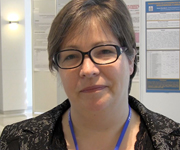Time is limited, and time is money, right? Doctors never seem to have enough time. As our population ages, there are more people in need of care and with spiraling higher costs doctors are required to see more patients per day. There’s little time for chit chat.
Time is limited, and time is money, right? Doctors never seem to have enough time. As our population ages, there are more people in need of care and with spiraling higher costs doctors are required to see more patients per day. There’s little time for chit chat.
At the same time medical science is making the practice and the treatment of serious health problems more complex. There are competing diagnostic tests, competing treatments, and many clinical trials. And empowered patients and family members want to have a consultation with their doctor, no longer accepting an “edict” telling them “this is what I am going to do.” Thankfully, people want to understand their situation and measure it against available options. Facilitating that is Patient Power’s mission.
If you think back, and as one healthcare administrator reminded me the other day, doctors used to hate it when patients asked questions. It slowed them down. They thought it showed a lack of respect. I am happy to report that in my interactions with leading medical experts, they are very open to questions and dialogue with patients like you and me. And they are making themselves very available today for our Patient Power team as we seek to interview them on video for an audience of patients worldwide. Several have agreed to be interviewed at the June meetings of the American Society of Clinical Oncology in Chicago and the European Hematology Association in Stockholm. While they share patients’ frustration that there is usually little time to have a full discussion in the exam room, and support explaining details and options to a wider audience on video and away from the crush and emotion of an office visit.
A great example is Patient Power’s recent series of interviews with Professor Claire Harrison, a myeloproliferative disease clinician and researcher from London. She spent 45 minutes with me giving detailed answers to questions many, many patients wish to ask about the latest research, the newest medicines, new ways of testing, what the future may hold and how soon. From my discussion with her in Madrid, when she graciously stepped out of a medical meeting with her peers, we have now edited six distinct video programs. Those are from among 18 we produced from that conference covering myelofibrosis, one of my personal diagnoses (the other is CLL), and polycythemia vera and essential thrombocythemia. Other world experts like Srdan Verstovsek from MD Anderson in Houston and Drs. Passamonti, Vannucchi, and Bacigalupo from Italy, and my own doctor in Spain, Cervantes, all took the time to be interviewed knowing it could reach many, many patients, they would never be able to speak with one-on-one. You can see them all together in our Myeloproliferative Disorders Center.
Medical researchers and clinicians are using the media like government officials (but maybe with more credibility), to reach a wider audience in a timely way. I have also found that they understand the difference between speaking to the general media, where most of the readers and viewers do not have the condition they treat or research, and a resource like Patient Power where we are a direct line to their patients, potential patients, potential clinical trial participants, and others worldwide affected by their condition. So they graciously give a lot of their time and we are all very appreciative.
By the way, your doctor and nurse may well be watching the same interviews with these experts. Patient Power’s content is viewed by, and shared by, medical staff members as well as patients. In fact, on one channel specifically for oncology professionals, Patient Power videos have had some 300,000 views and we are now the third most watched channel on Oncology Tube, one of our partners.
It’s thrilling to bring patients and caregivers current information, direct from top experts, on an ongoing basis. In the coming weeks you will see Patient Power focus more on some very specific conditions. That means some of the world renowned doctors we’ve interviewed in those conditions may become “regulars” on our videos. It’s good for you and, as noted, it’s good for them.
The experts are increasingly understanding we are all in this together around specific diagnoses and that modern communication 24/7 is our friend.









